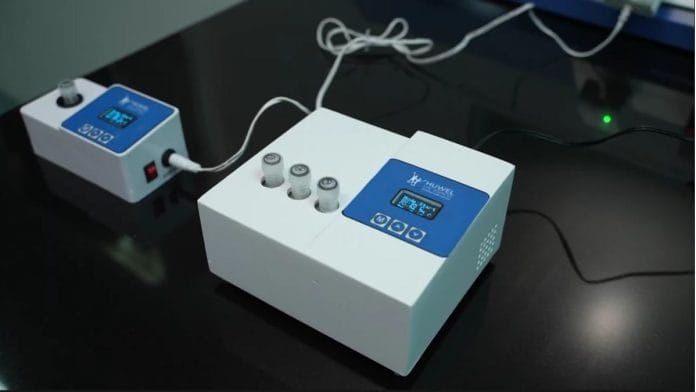New Delhi: An indigenous open-system RT-PCR (Reverse Transcription Polymerase Chain Reaction) kit promises to make tuberculosis screening simpler, faster and five times more affordable.
The Quantiplus MTB FAST Detection Kit, developed by Huwel Lifesciences, and approved by the Indian Council of Medical Research (ICMR) and the Central Drugs Standard Control Organisation (CDSCO), works by eliminating one of the most complex steps of the screening process—DNA extraction.
The kit was launched Saturday by J.P. Nadda, Union Minister for Health and Family Welfare, while inaugurating the third International Symposium on Health Technology Assessment (ISHTA 2025) at Bharat Mandapam in New Delhi.
RT-PCR is a laboratory technique used to detect the genetic material of pathogens, like bacteria and viruses. In tuberculosis screening, it helps identify the presence of TB bacteria with high accuracy, enabling early diagnosis and treatment.
Shesheer Kumar, co-founder of Huwel, explained how traditional RT-PCR testing involves the cumbersome DNA extraction step, where genetic material is isolated from a sample using a process called centrifugation. This step requires separate rooms, specialised equipment and trained personnel with advanced degrees.
More importantly, it poses a significant risk of cross-contamination. When a high-load TB sample is processed, tiny DNA particles can become airborne, potentially contaminating subsequent samples and leading to false positives.
“We have completely eliminated this extraction process,” Kumar told ThePrint. “Instead of multiple processes and manual mixing of chemicals, the new open-system RT-PCR kit comes with pre-filled, sealed PCR tubes that already contain all the necessary reagents. The process is now as simple as peeling off the seal, adding the sample directly to the tube, and placing it in a real-time PCR machine for testing.”
By eliminating the need for specialised equipment and trained personnel to handle complex steps, this method reduces costs, minimises contamination risks, and allows for broader and more accessible TB testing.
“This innovation removes the technical complexity associated with RT-PCR, making it easier to use in resource-limited settings, including the rural areas,” Kumar added.
India wishes to eliminate Tuberculosis from the country this year—five years ahead of the global target of 2030. The new RT-PCR kit offers a significant improvement in screening capacity, allowing for large-scale testing at a fraction of the cost.
While traditional methods, like the Truenat test and CBNAAT (Cartridge-based Nucleic Acid Amplification Test) can process only 10-15 samples per day, the new system allows for testing of 5,000-6,000 samples daily.
“With this kit, we can process 96 samples at a time in real-time PCR machines—nearly 30 times more than existing methods,” Kumar said.
Currently, TB screening using existing methods costs around Rs 850 per test under government-subsidised rates.
Options like CBNAAT and Truenat cost approximately Rs 700-750 per test. “With our kit priced between Rs 120 and Rs 150, we are bringing the cost down to nearly one-fifth or even lower,” Kumar added.
“The kit is already available in the market,” he said, explaining that both government and private hospitals can procure it through multiple channels.
It is listed on the ICMR website, the GeM (Government e-Marketplace) portal and the Central TB Division (CTD). “The pricing has already been set based on Health Technology Assessment (HTA), and the kit will soon be available on the Nikshay portal as well,” Kumar further said.
He also noted that since the kit is CDSCO-approved, private hospitals have the option to source it directly from the manufacturer.
(Edited by Mannat Chugh)
Also Read: A personalised vaccine for pancreatic cancer brings ‘hope where none existed before’






